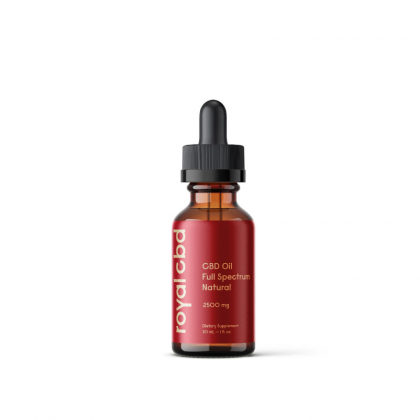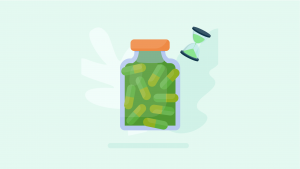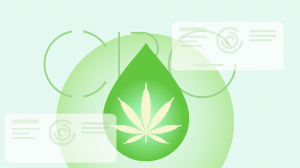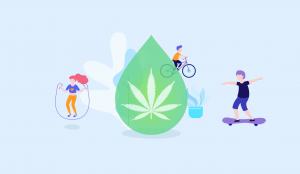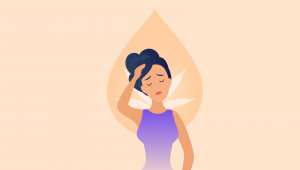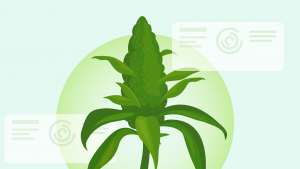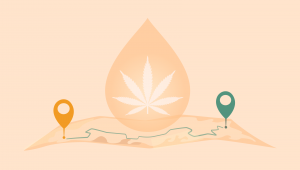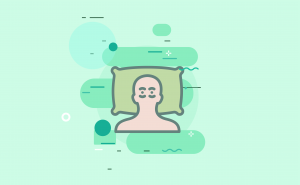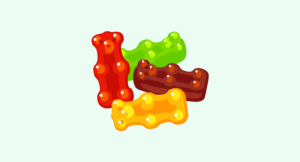| Total CBD: | 500 – 2500 mg |
| Potency: | 16.6 - 83.3 mg/mL |
| Cost per mg CBD: | $0.12 – $0.18 |
| Extract Type: | Full-spectrum |
| THC Content: | <0.3% |
Evidence based
Best CBD Oil for Anxiety & Depression: Benefits, Safety, & Research
Feeling stressed? Anxious? Depressed?
CBD may help regulate your stres, ease anxiety, and alleviate symptoms of depression.
Here’s how it works.
Everyone experiences stress and mood swings from time to time — but there’s a clear distinction between “healthy stress” and “unhealthy stress”.
Too many people in today’s world experience a rollercoaster of emotions, and crippling stress, anxiety, and depression on a daily basis.
In this article, we’ll review the best CBD oils and other products to use for stress, anxiety, & depression — along with current research to support these effects, information on dosage, and tips for using CBD safely and effectively.
You’ll learn what makes CBD so useful for mental health disorders, and how people are using them as an alternative to antipsychotic medications.
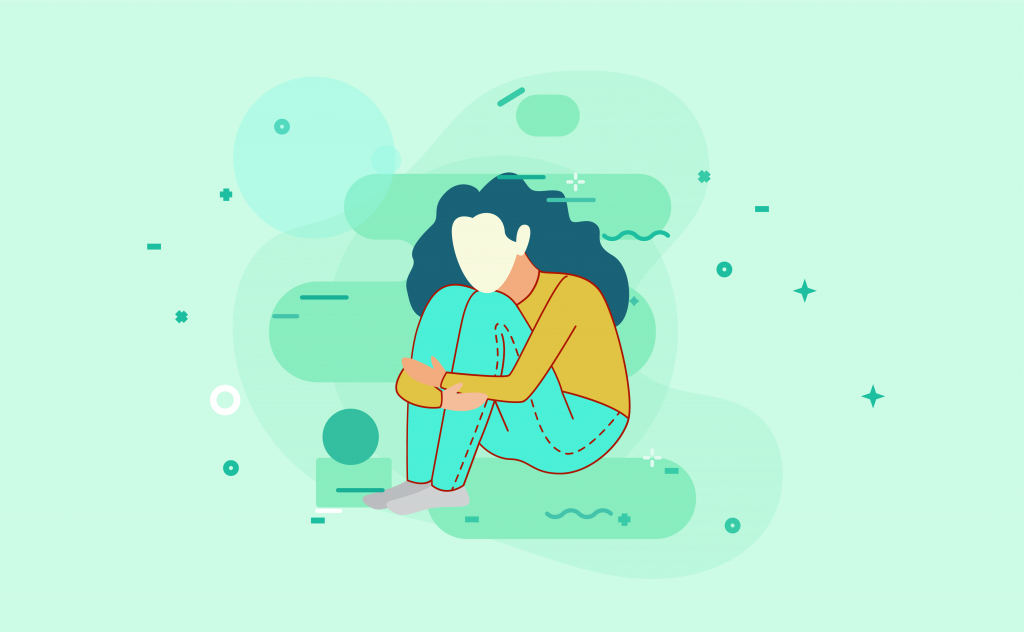
Best CBD Products for Anxiety & Depression
- Royal CBD Oil — Best CBD Oil For Anxiety
- Kiara Naturals CBG + CBD Oil — Best CBG Oil For Anxiety
- Kat’s Naturals Relax — Best Low-Potency Oil for Stress
- Phoria CBD Tincture with DHA Oil — Best CBD Stress Formula
- Joy Organics CBD Oil — Honorable Mention
- Nordic Oil CBD Oil — Best Option For European Residents
- The Brothers Apothecary Mental Clarity Capsules — Best CBD Capsules For Anxiety
1. Royal CBD Oil — Best CBD Oil For Anxiety Overall
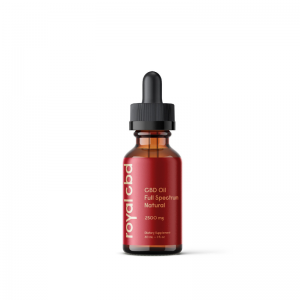
$49 – $229
Royal CBD
Royal CBD Oil 30 mL
| Total CBD: | 500 – 2500 mg |
| Potency: | 16.6 – 83.3 mg/mL |
| Cost per mg CBD: | $0.12 – $0.18 |
| Extract Type: | Full-spectrum |
| THC Content: | <0.3% |
The 1000 mg CBD oil by Royal CBD made the top of our list for three main reasons:
- It’s a simple formula without any additional ingredients, just high-CBD hemp extract and MCT oil — this is great for use with mood and stress support because it lowers the chances of a compound in the oil negatively interacting with other medications you might be taking.
- This oil is made with premium-quality hemp — all Royal CBD hemp is tested in a third-party lab for quality and purity, and again once the final product is complete.
- Royal CBD Oils are made with a full-spectrum extract — which has been shown numerous times to be the best option for mood and stress support compared to CBD oils made from an isolate.
Enter the code DAILY10 for 10% off
2. Kiara Naturals CBG + CBD Oil — Best CBG Oil For Anxiety
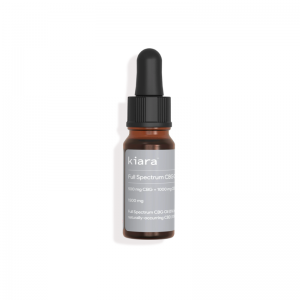
$150
Kiara Naturals
Kiara Naturals CBG + CBD Oil 10 mL
| Total CBD: | 1000 mg |
| Total CBG: | 500 mg |
| Potency: | 150 mg/mL |
| Cost per mg: | $0.09 |
| Extract Type: | Full-Spectrum |
This CBD oil from Kiara Naturals combines high-potency CBD (100 mg/mL) with another anti-anxiety and antidepressant cannabinoid called CBG (cannabigerol).
CBG has been shown to inhibit the reuptake of a neurotransmitter called GABA — which is the primary neuroinhibitory compound in the brain. By blocking the reuptake and breakdown of GABA, CBG oils can promote a state of relaxation and reduce anxiety.
This oil packs a punch. You only need a couple of drops for a strong dose of cannabinoids.
3. Kat’s Naturals Relax — Best CBD Oil For Stress
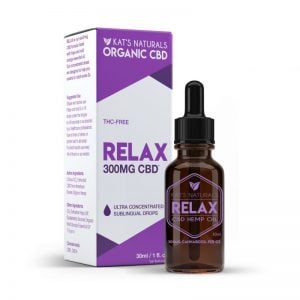
$19.99 – $59.99
Kat’s Naturals
Kat’s Naturals Relax THC-Free Sublingual CBD Oil 5 mL – 30 mL
| Total CBD: | 50 mg – 300 mg |
| Potency : | 10 mg/mL |
| Cost per mg CBD: | $0.20 – $0.40 |
| Extract Type: | Isolate |
| THC Content: | 0.0% |
Kat’s Naturals combines other medicinal herb species in with their oils for added potency. Their Relax oil contains hops (Humulus lupulus) — which is a potent relaxant with similar, and complementary effects to CBD (it works primarily through GABA).
In fact, hops are one of the only other members of the cannabis family (Cannabaceae). They produce similar sedative ingredients, including the terpene humulene, as hemp flower.
4. Phoria CBD Tincture with DHA Oil — CBD Oil With DHA
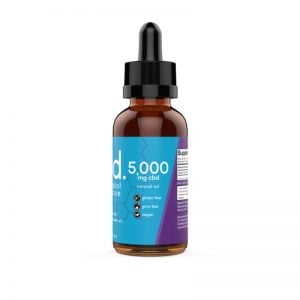
$29.99 – $99.99
Phoria
Phoria CBD Tincture with DHA Oil + CBD Oil Nano Tincture 30 mL
| Total CBD: | 300 – 5000 mg |
| CBD Potency: | 10 – 83.3 mg/mL |
| Cost per mg CBD: | $0.02 – $0.10 |
| Extract Type: | Full-Spectrum |
Phoria makes CBD oils in several different configurations — but we prefer the DHA and nano CBD option when it comes to mood support.
There’s a lot of research confirming the role omega-3 fatty acids like DHA have on mood and cognitive function. This oil combines a DHA-rich carrier oil with fast-absorbing CBD extract for even greater benefit.
You need to take a fairly high dose of DHA to get the benefits, so we recommend ordering the low potency version of this oil (10 mg/mL) so you can take more volume of DHA-rich oil with each dose.
The benefits of using DHA for mood support can take a while — so be patient and persistent with your CBD oil regimen.
5. Joy Organics CBD Tincture
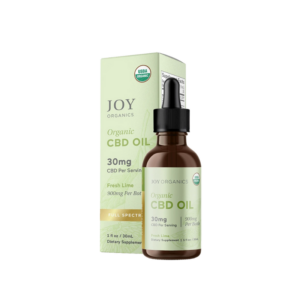
$45.00 – $125.00
Joy Organics
Joy Organics Full-Spectrum Tinctures 30 mL
| Total CBD: | 450 – 2250 mg |
| Potency: | 15 – 75 mg/mL |
| Cost per mg CBD: | $0.01 – $0.07 |
| Extract Type: | Full-Spectrum |
| THC Content : | <0.3% |
For the price, this is a decent all-purpose CBD oil from Joy Organics. It’s strong enough to use for managing anxiety, but may not be potent enough for any significant shift in mood.
The real advantage of this oil is its flavor — you can choose between several different options, including lime, mint, orange, lemon, unflavored, and our favorite — tropical sunrise.
All Joy Organics tinctures are independently tested and the customer service from this company is rated 5/5. They’re helpful, insightful, and offer no hassle if you need to return your order for any reason.
6. Nordic Oil CBD Oil
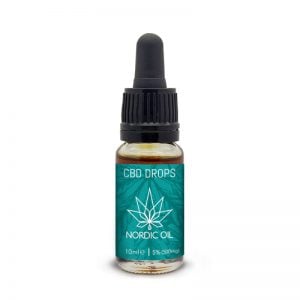
€39.00 – €129.00
Nordic Oil
Nordic Oil Full-Spectrum CBD Oil (Europe) 10 mL
| Total CBD: | 500 – 2000 mg |
| CBD Potency: | 50 – 200 mg/mL |
| Cost per mg CBD: | €0.06 – €0.08 |
| Extract Type: | Full-Spectrum |
| THC Content: | <0.02% |
For our European readers, we had to include an option that’s a little closer to home. CBD oils are legal in most countries, but there’s still a lot of reports of people not receiving their order if shipped from the US. For this reason, it’s best to stick to European brands whenever possible.
Nordic Oil is undeniably one of the best European CBD manufacturers we’ve tested. They have an extensive lineup of full-spectrum, high-potency CBD products well-suited for alleviating stress and anxiety.
Other European brands worth mentioning are Endoca and Blessed CBD (UK-only).
7. The Brother’s Apothecary Mental Clarity Capsules
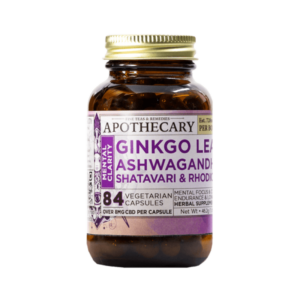
$15 – $50
The Brothers Apothecary
The Brother’s Apothecary Mental Clarity Capsules 21 – 84 Capsules
| Total CBD: | 168 – 672 mg |
| Potency: | 8 mg per Capsule |
| Cost per mg: | $0.07–$0.09 |
| Extract Type: | Full-Spectrum |
This is not a CBD oil, but we wanted to include it because it’s arguably one of the best CBD products in general for navigating anxiety.
This holistic CBD capsule blend from The Brother’s Apothecary contains an impressive combination of full-spectrum hemp along with anti-anxiety and adaptogenic herbs including ashwagandha, shatavari, and rhodiola.
The “mental clarity” aspect comes from the inclusion of a herb called gingko — which has long been used to help sharpen the mind and improve focus. This is useful for people suffering from anxiety because one of the main side effects is brain fog and difficulty staying focused and on-task.
Related: Best CBD Capsules.
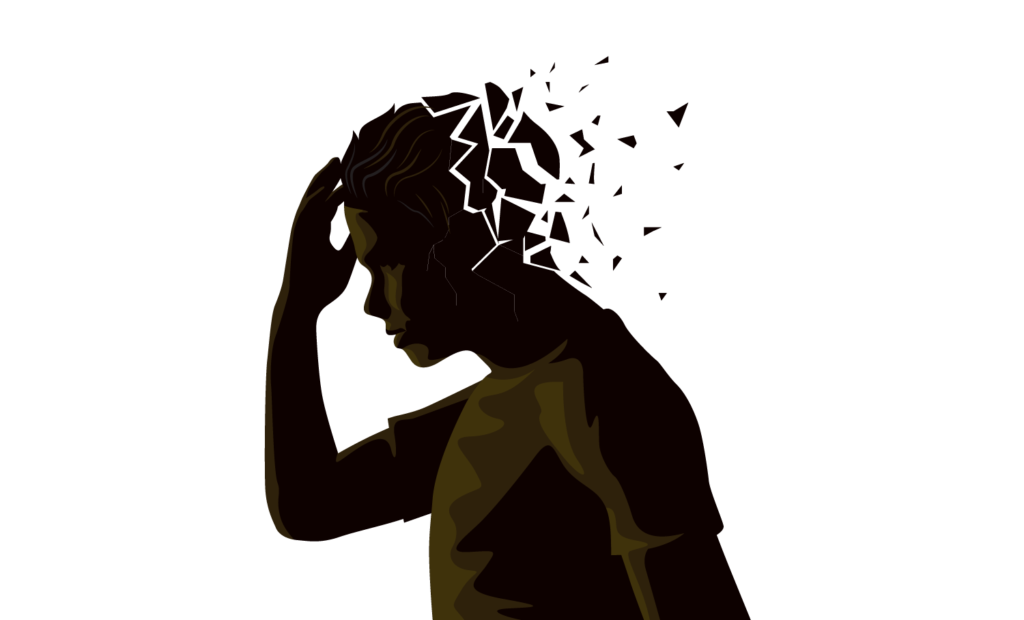
CBD Oil & Mental Health: How it Works
CBD is a great supplement to take alongside stress, anxiety, or mood disorders.
This unique compound interacts with a system in the body known as the endocannabinoid system — which plays a key role in the stress response and regulation of our mood.
The best CBD oils for anxiety and mood disorders are made from full-spectrum extracts, provide relatively high concentrations of CBD (at least 30 mg/mL), and have been independently tested for quality and potency.
Some people experience the benefits of CBD oils immediately — others need to take the oil for several days or weeks before there’s any noticeable difference.
It’s important to be patient and persistent when using CBD. Monitor how you’re feeling and take other measures to help alleviate anxiety.
The benefits of CBD oil for anxiety, depression, & mood disorders include:
- Calms the mind by boosting GABA activity
- Regulates serotonin & dopamine levels in the brain
- Reduces brain inflammation
- Promotes more restorative sleep
- Reduces cortisol levels
- Protects the body from oxidative damage
Related: The Best CBD Gummies for Anxiety.
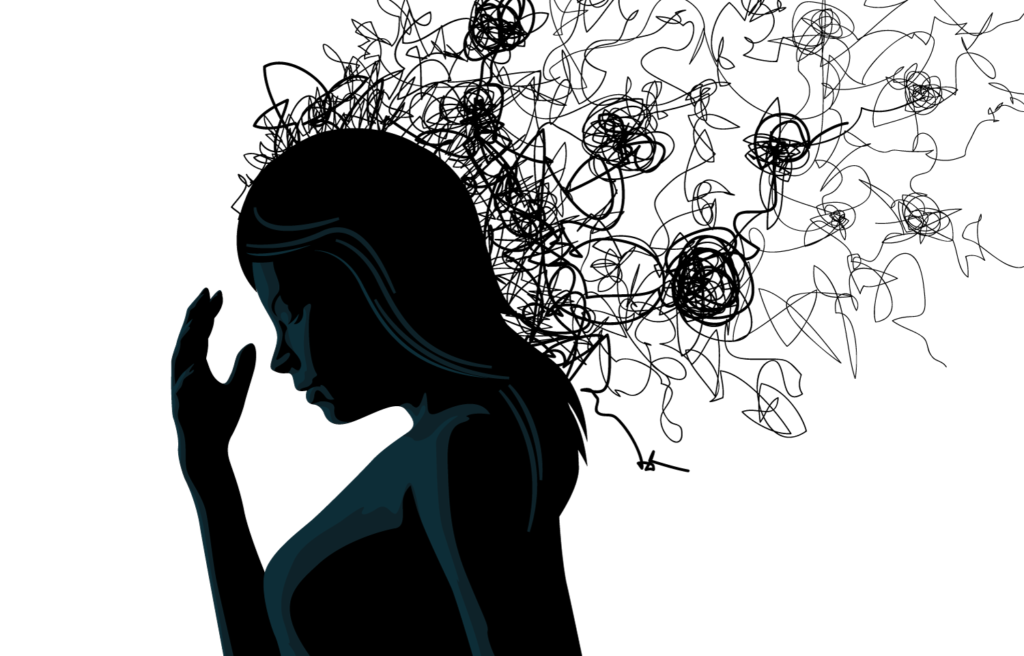
1. CBD Oil Calms The Mind By Promoting GABA Activity
GABA is the brain’s primary neuroinhibitor — which means it’s tasked with being the brake pedal for the mind. When we become anxious or agitated, it’s up to GABA to slow us down and bring us back to a more normal, relaxed state.
Anxiety sufferers often experience a problem with GABA. Without this compound keeping brain activity in check, we experience bouts of anxiety, panic attacks, insomnia, and more.
CBD has been shown to interact with GABA receptors in the brain [34].
The interaction is similar to the effects of common prescription anxiety medications like Xanax or Valium, but with much less force. Instead of directly activating these receptors, CBD helps improve the ability for naturally-produced GABA to bind to the receptor and exert its effect.
The result is a dramatic reduction in anxiety levels as well as other benefits like muscle relaxation and improved sleep onset.
Related: Does CBD Oil Interact With Xanax (Alprazolam)?
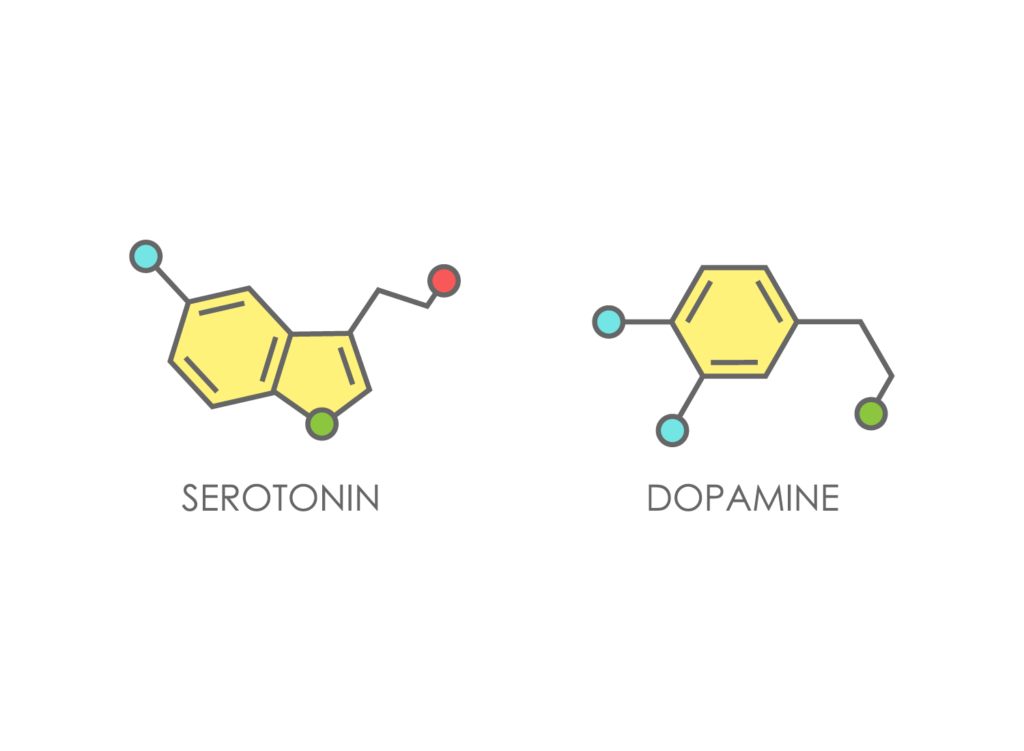
2. CBD Regulates Serotonin & Dopamine
Serotonin, dopamine, and norepinephrine are all key neurotransmitters involved in regulating mood and mental state. Imbalances with these neurotransmitters can lead to anxiety and depression.
CBD has been shown to stimulate the serotonin receptors (5HT1A) [30]— which leads to increased serotonin activity in the brain. Low 5HT1A receptor activity has been correlated with panic attacks and anxiety [31].
Dopamine also plays a key role in regulating anxiety levels. Low dopamine levels in mice are correlated with an increase in generalized anxiety symptoms [32]. CBD has been shown to have a mild stimulating effect on the dopamine receptors [9] — which increases dopamine levels in the brain and alleviates anxiety symptoms.
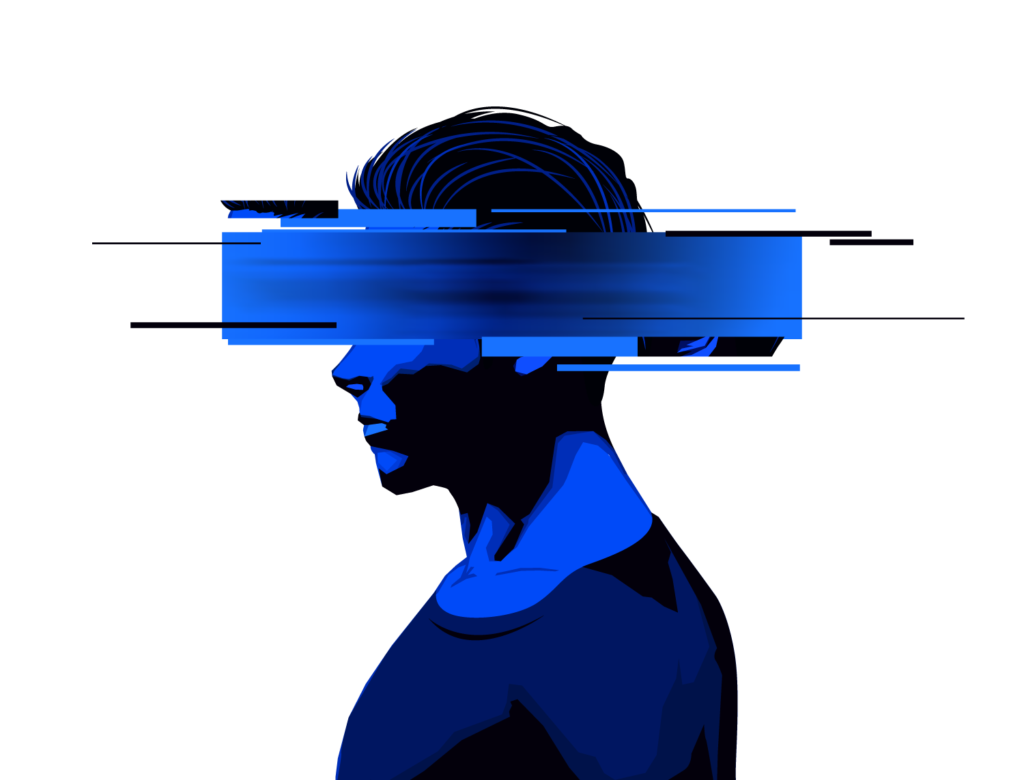
3. CBD Reduces Inflammation In The Brain
New evidence has recently come to light implicating neuroinflammation (inflammation in the brain) to be a major underlying cause for anxiety and depression [35].
The chemical balance in the brain must be kept within a tight range of controls. Compounds in our blood may interfere with this delicate balance, so a special membrane lining the blood vessels in our brain (called the blood-brain barrier) works to keep unwanted molecules from being able to enter the brain directly.
If this lining becomes inflamed, it can result in damage to the integrity of this barrier. Compounds in the blood enter the brain and affect neurotransmitters like serotonin, dopamine, norepinephrine, GABA, glutamate, and more — potentially leading to anxiety.
CBD has been shown to reduce neuroinflammation and enhance the regeneration of damaged nerve cells caused by the inflammatory process [36].
4. CBD Promotes Longer, More Restorative Sleep
Sleep deprivation is another common cause of anxiety. A 2006 study showed that just one night of sleep deprivation resulted in significantly higher anxiety scores the following day [37].
Anxiety itself is a common cause of insufficient sleep — resulting in a self-perpetuating negative feedback look. High anxiety levels lead to lower sleep quality, which leads to more anxiety.
CBD can be used to break the cycle by managing anxiety symptoms during the day and improving sleep quality at night.
A review paper analyzed the results of research on over 2000 participants to explore the impact of CBD and other cannabinoids on sleep. The study concluded that there was a clear increase in sleep quality and duration in around 50% of the patients taking part in these clinical studies [38].
5. CBD Reduces Cortisol Levels
Anxiety is directly related to our stress response — called the “fight or flight” response.
Stress begins with a region of the brain that includes the hypothalamus and pituitary gland. This part of the brain is tasked with controlling the release of hormones from other organs in the body, including the adrenal glands. The connection between these organs is referred to as the HPA-axis (hypothalamic-pituitary-adrenal axis).
When we’re faced with a stressful situation — such as coming face to face with a hungry animal or feeling the pressure of an upcoming deadline — the hypothalamus sends a signal to the adrenal glands to start releasing cortisol.
Cortisol is responsible for inducing the changes we perceive as stress. It increases heart rate and blood pressure, stimulates the mind, and forces blood sugar levels to increase.
Usually, when the stressful situation is mitigated, the hypothalamus stops telling the adrenal glands to secrete cortisol, and levels go back to normal.
However, many people remain in the “stress” state for long periods of time. Cortisol continues to activate the stress response, leading to symptoms associated with anxiety.
CBD and other cannabinoids have been shown to modulate the hypothalamus through its effects on the endocannabinoid system [39]. Improving the sensitivity of the hypothalamus leads to a dramatic reduction in cortisol levels.

6. CBD Protects Against Oxidative Damage
One of the main ways stress causes so much destruction is through something called oxidative damage.
Higher blood sugar and increased metabolic activity stress causes can lead to a buildup of free radical products which can damage tissues all over the body.
Normally this is cleared up when we enter the rest and digest mode in a state of relaxation, but of course, when we’re stressed for long periods of time these free radicals persist.
CBD oil is high in antioxidant compounds [48] that help neutralize free radical molecules and protects the body from their damaging influence.
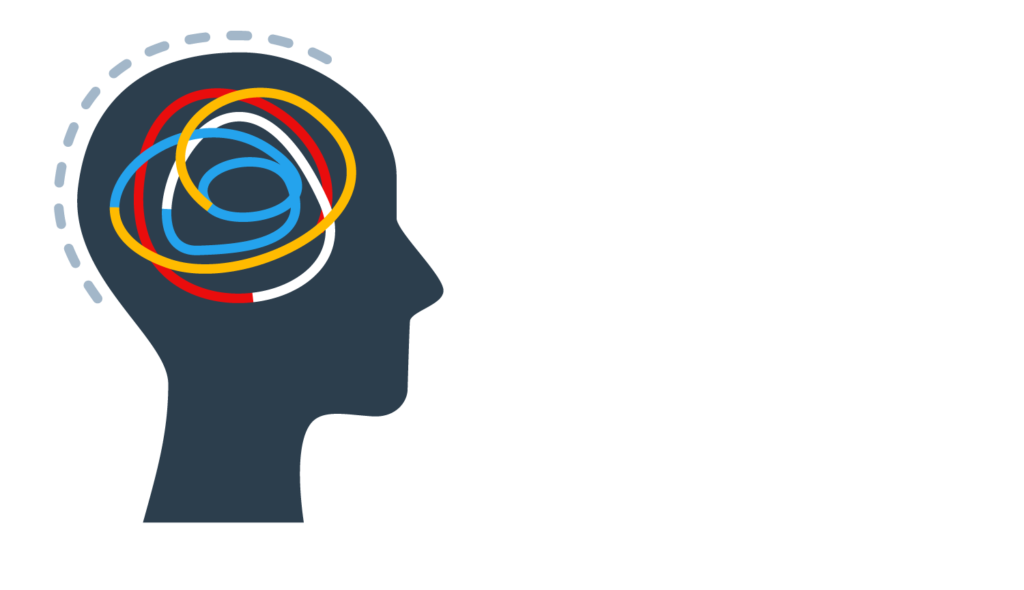
Anxiety 101: Causes, & Treatment Options
Everybody has experienced anxiety at some point in their lives. It’s completely normal to feel anxious — to an extent.
Feeling anxious too often can lead to a variety of other health issues and makes it difficult to carry out daily responsibilities.
Healthy anxiety helps us deal with dangers — such as coming face to face with a hungry animal, getting into a fight, or standing on a ledge a thousand feet from the ground below. Our anxiety helps us run away from danger, win a fight, or hold on more tightly to avoid falling.
Anxiety disorders happen when we feel anxiety too often, or experience a level of anxiety inappropriate for the situation.
For example, social anxiety disorder is characterized by severe, debilitating anxiety around the fear of being judged by others. This form of anxiety can make it hard for sufferers to go out in public, visit with friends, or interact with strangers in any way.
Different Anxiety Disorders Include:
- Generalized anxiety disorder (GAD)
- Obsessive compulsive disorder (OCD)
- Panic disorder
- Specific phobias
- Social anxiety disorder (SAD)
- Selective mutism
- Separation anxiety disorder
- Post Traumatic Stress Disorder (PTSD)

What Causes Anxiety?
Anxiety has many causes. Virtually anything that triggers stress can result in anxiety. The most common causes are financial concerns, loss of a friend or family member, diagnosis of a health disorder, excessive stimulant intake, and lack of sleep.
Causes of Anxiety May Include:
- Alcohol use
- Caffeine intake
- Heart disease
- Inability to effectively cope with stress
- Nutritional deficiencies
- Recreational drug use & addiction
- Side effects of medications
- Sleep deprivation
- Smoking
- Traumatic history
What Are The Symptoms of Anxiety?
The symptoms of anxiety are different for everybody. The most common symptoms are increased heart rate, elevations in blood pressure, loss of focus, changes in mood, and insomnia.
Symptoms can come and go throughout the day, or remain consistent all day long.
Common symptoms of anxiety disorders include:
- Rapid heartbeat
- High blood pressure
- Confusion
- Dizziness
- Tinnitus (ringing in the ears)
- Mood changes
- Poor concentration
- Insomnia
- Digestive disturbances (constipation or diarrhea)
- Hyperventilation
- Frequent cold/flu
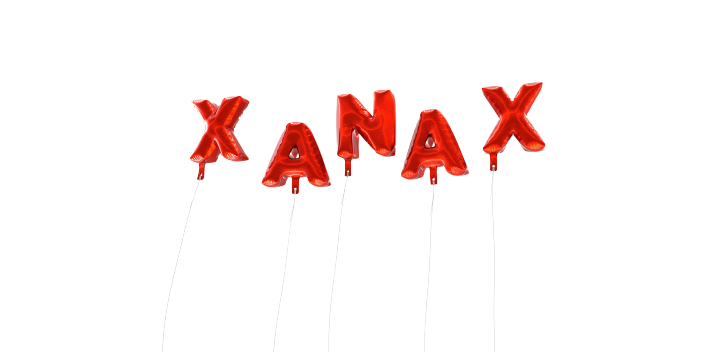
Are Pharmaceutical Anxiety Medications Dangerous to Our Health?
There are a variety of prescription medications doctors can choose from to treat anxiety. While these medications work in the short term, many of them lead to severe side effects, dependency, and potential for abuse with long-term treatment.
The most common class of drugs used to treat anxiety are the benzodiazepines (such as Xanax). These drugs target the GABA receptors in a similar way to CBD, but with a much stronger effect.
In as little as 2 weeks, the body will start to form a dependency on benzodiazepines. When this happens, the GABA receptors adapt to the drug in an attempt to restore balance. GABA receptors become hidden in order to reduce the effects of the drug.
If the drug is no longer used, we lose our ability to activate GABA (because we have fewer receptors available in response to the drug). The results of this are the same symptoms that prompted us to take it in the beginning — anxiety, and insomnia. We become reliant on having the drug in our system for us to avoid anxiety attacks.
In short, taking prescription anxiety medications is safe short-term, but beyond 2-weeks of use, they can have the opposite effect — causing severe panic attacks and anxiety as soon as the medications start to wear off.
Common prescription Anxiety Medications Include:
- Alprazolam (Xanax)
- Clonazepam (Klonopin)
- Chlordiazepoxide (Librium)
- Diazepam (Valium)
- Lorazepam (Ativan)
- Temazepam (Restoril)
- Triazolam (Halcion)
Related: Will CBD Interact with Benzodiazepines?

Depression 101: Causes & Treatment Options
Depression is the most common mood disorder — affecting as many as 300 million people around the world each year, according to The World Health Organization.
There are a few different types of depression — characterized by the presence of other symptoms and the length of time the condition was present. All forms of depression involve chronically low mood and motivation. Other symptoms may include fatigue, chronic pain, insomnia, anxiety, or low libido.
There Are Three Severity Levels of Depression:
- Mild depression — involving low-grade loss of interest or low motivation.
- Moderate depression — involves a major loss in motivation and low energy, and may or may not interfere with daily responsibilities.
- Severe depression — can include thoughts of suicide or complete loss of motivation.
What Causes Depression?
There isn’t a single cause for depression. In most cases, it’s merely a symptom of other underlying medical conditions or unhealthy diet and lifestyle choices.
Causes of Depression May Include:
- Substance abuse
- Chronic stress
- Bereavement
- Medication side-effects
- Genetic diseases (such as Huntington’s Disease or Multiple Sclerosis)
- Nutritional deficiencies (including B vitamins, magnesium, zinc, and protein).
Does Chemical Imbalance Cause Depression?
The suggestion that depression is the result of neurotransmitter dysfunctions, usually involving serotonin, is more than 50 years old.
Research has come a long way since this time, especially in the realm of neurology.
Although many doctors stick to the idea that low neurotransmitter levels cause depression, this is far oversimplified, and no explicit connections have been established between the two yet.
The evidence to support this hypothesis involves something related, called tryptophan depletion. In this process, the precursor for serotonin, tryptophan, is completely blocked, causing serotonin levels to decrease and depressive symptoms to begin appearing.
In healthy individuals, tryptophan depletion doesn’t cause depression. This only happens in people who have a predisposition for depressive symptoms [44].
So, how can I incorporate CBD oil into my health routine to alleviate symptoms of depression?
The key to CBD for something as complex as depression is to make sure you use it in combination with other diet and lifestyle changes.
Performing activities that help to reduce stress, increase antioxidant protection and lower inflammation is going to go a long way in alleviating the symptoms of depression.
It’s also important to always consult with your doctor before starting CBD oil if you have depression, especially if you’re currently taking other antidepressant medications.
What Are the Symptoms of Depression?
Although many conditions have depression listed as a symptom, depression is also a condition with its own set of symptoms.
Confusing, I know, but then again the human body is incredibly complex.
Depression tends to come in packages with a series of other symptoms.
Some of the Signs and Symptoms of Depression Include:
- Sadness
- Loss of interest in pleasure activities
- Loss of motivation
- Insomnia
- Fatigue
- Feelings of worthlessness
- Difficulty concentrating
- Changes in appetite
- Apathy
- Lack of ability to feel pleasure (anhedonia)
- Irritability
- Subservience (prostration)
- Changes in habits
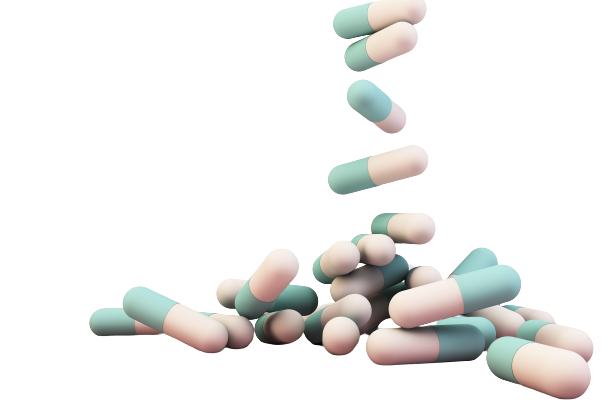
Common Treatment Options for Depression
Treating depression involves finding the cause.
Psychologists will usually identify if there are any signs of abuse, personal hardship, stressful events, substance abuse, or other causes of depression that may be at play.
Dieticians, nutritionists, and natural health therapists will look at the diet, and consider how the lifestyle of those affected factor into their depression.
Often, a diet and lifestyle change is enough to alleviate most symptoms of depression.
Doctors address depression as a condition of imbalance. They’ll give medications such as monoamine oxidase inhibitors (MAOIs), tricyclic antidepressants (TCAs), and selective serotonin reuptake inhibitors (SSRIs) to counterbalance this.
1. MAOIs (Monoamine Oxidase Inhibitors)
MAOIs are a class of pharmaceutical medications used for treating depression.
It involves inhibiting the enzyme (monoamine oxidase) that breaks down monoamine neurotransmitters (dopamine, serotonin, norepinephrine).
By blocking this enzyme, serotonin, dopamine, and norepinephrine takes longer to break down, and lingers in the neurons for longer periods.
If the cause of the depression is low serotonin or dopamine, this class of compounds is useful for boosting activity and alleviating symptoms. It won’t fix the problem, however, because as soon as the drug stops — everything goes back to normal. In some cases, we have rebounding drops in dopamine and serotonin — causing even more severe symptoms.
List of Common MAO Inhibitors:
- Isocarboxazid (Marplan)
- Phenelzine (Nardil)
- Selegiline (Emsam)
- Tranylcypromine (Parnate)
Related: Will CBD Interact with MAO Inhibitors?
2. SSRIs (Selective Serotonin Reuptake Inhibitors)
SSRIs are the most common class of antidepressants used today.
Many believe that low serotonin levels are the leading cause of depression. Therefore, if there’s a way to target serotonin to boost its activity, we can alleviate the symptoms of depression.
A selective serotonin reuptake inhibitor works to block serotonin from reabsorption and dissolution in the synapses of the brain.
This causes serotonin to build up outside the synapses and therefore boosts overall mood.
It’s important to note that SSRIs don’t fix the cause of the low serotonin, and there’s a lot of evidence to support most cases of depression don’t involve a deficiency of serotonin [43]. Instead, research now indicates that depression is the direct result of neuroinflammation.
This explains why SSRIs have less effect on people as inflammatory markers go up in their bloodstream.
List of SSRI Medications:
- Citalopram (Cipramil & Celexa)
- Dapoxetine (Priligy)
- Escitalopram (Cipralex & Lexapro)
- Fluoxetine (Prozac, Rapiflux, Sarafem, Selfemra & Oxactin)
- Fluvoxamine (Faverin)
- Paroxetine (Seroxat)
- Sertraline (Zoloft, Lustral)
- Vortioxetine (Brintellix)
Related: Will CBD Interact with SSRIs?
3. Tricyclic Antidepressants
Tricyclic antidepressants are an older generation of antidepressant medications.
Newer versions like MAOIs and SSRIs have mostly replaced them.
They block the reabsorption of serotonin and norepinephrine, which makes them very similar to SSRI medications.
The difference is that tricyclics produce a variety of undesired effects on other neurotransmitters as well — which gives them unpredictable side effects.
List of Tricyclic Antidepressants:
- Amitriptyline (Elavil)
- Amoxapine (Asendin)
- Desipramine (Norpramin)
- Doxepin (Sinequan, Quitaxon & Aponal)
- Imipramine (Tofranil)
- Nortriptyline (Pamelor)
- Protriptyline (Vivactil)
- Trimipramine (Surmontil)
Related: Will CBD Interact with Tricyclic Antidepressants?

CBD Oil For Other Mood Disorders
Mood disorders (also called affective disorders) are a collection of neurological conditions affecting our ability to regulate and maintain emotion.
There are many different kinds of mood disorders, and CBD works a little differently for each one.
CBD has the biggest impact on mood disorders underpinned by inflammatory or autoimmune disease, or in people experiencing hyperactivity with their moods — such as bipolar disorder or mania. For depressive disorders, CBD offers benefits for common side effects like insomnia or low energy.
What Causes Mood Disorders?
- Substance abuse
- Chronic stress
- Bereavement
- Medication side-effects
- Neurodegenerative disorders
- Nutritional deficiencies
- Genetic predisposition
- Post traumatic stress
- Chronic anxiety
Here are the most common types of mood disorders and how CBD may be able to help:
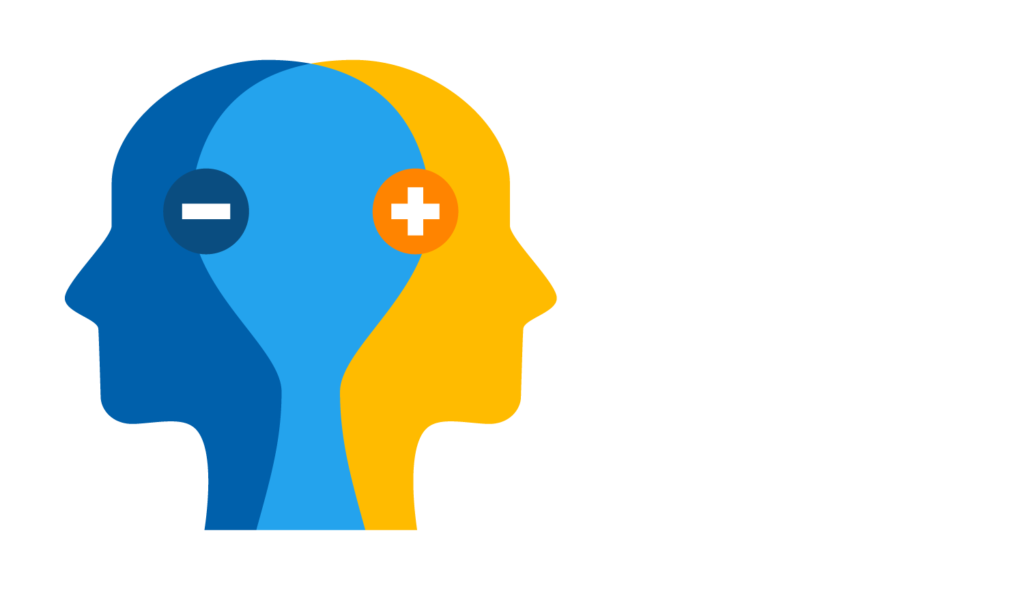
1. Bipolar Disorder
Bipolar disorder is a neurological disorder involving extreme shifts in mood — going from periods of deep depression to euphoric mania and everything in between.
There’s no cure for bipolar disorder, and medications for the condition are often hit or miss in their effectiveness.
A large clinical trial is currently investigating the potential benefits of CBD as part of a treatment plan for bipolar individuals. Although the study isn’t scheduled to finish until 2020, the results are looking promising for CBD.
The Benefits of CBD For Bipolar Disorder
CBD may be effective for bipolar disorder — however, bipolar disorder affects everyone differently. What might work on one person could make symptoms worse for another. So it’s important to discuss the use of CBD with your doctor or psychologist before giving it a try.
If you decide to use CBD, always start with the smallest dose possible and build up gradually from there to see how it affects your symptoms.
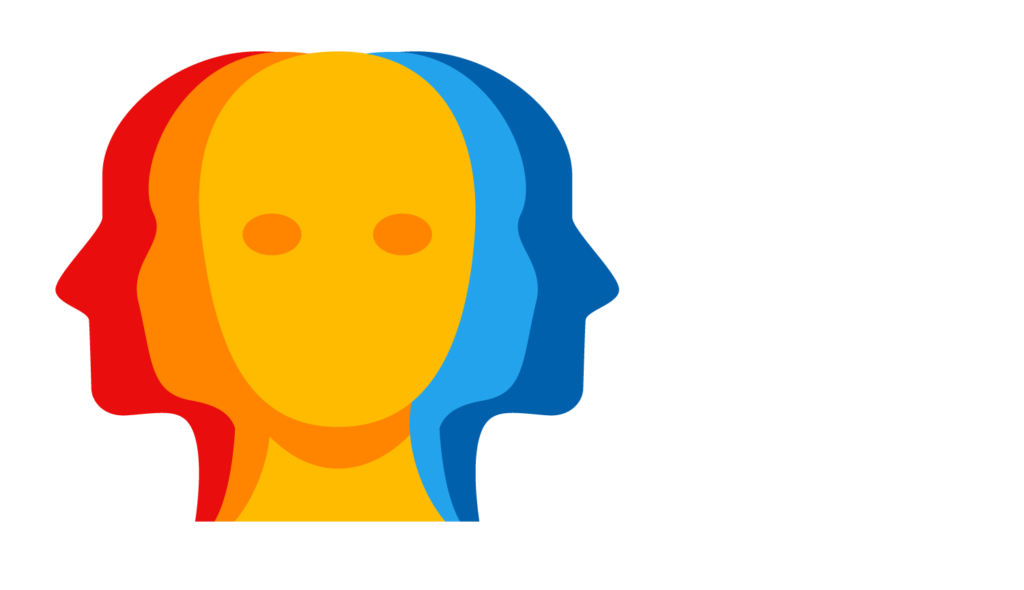
2. Mania
Mania (also referred to as manic syndrome) is a serious condition involving abnormally high energy levels, feelings of euphoria, and frequent anxiety attacks. It’s the opposite of depression, but it can be just as debilitating.
The manic syndrome can lead to increased tendencies for violence, aggression, irritability, and delusions. This condition can be dangerous, causing people to become reckless and at a higher risk of injuries.
The Benefits of CBD For Mania
Use CBD with extreme caution for mania due to concerns of worsening the condition. Mania is a severe condition that requires the care of trained medical professionals.
The cause of mania is different from one person to the next, and although there are reports of people using CBD to treat this symptom effectively — there are plenty of reports about cannabis products making symptoms worse as well.
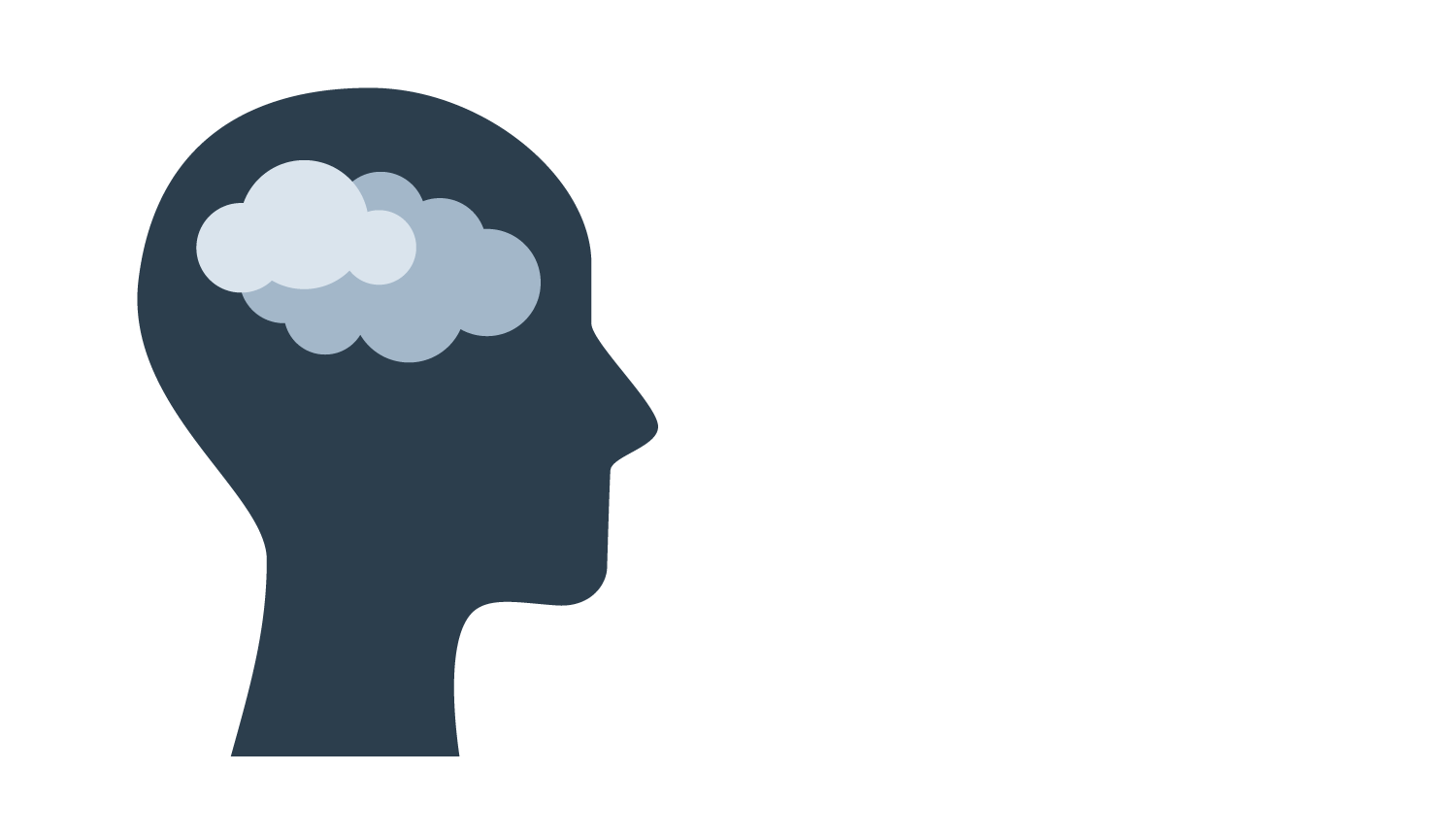
3. Hypomania
Hypomania is similar to mania but involves more mild symptoms. It’s somewhere between depression and mania.
Symptoms of hypomania involve extended periods of euphoria and disinhibition but aren’t as severe as mania.
The Benefits of CBD For Hypomania
CBD can be used to support some of the side effects of hypomania, such as insomnia and anxiety. Similarly to mania, CBD should be used cautiously with this condition. Always start with a small dose and increase gradually.
Once you know how it affects you individually and you’ve confirmed it doesn’t make symptoms worse, try increasing the dose.

4. Seasonal Affective Disorder (SAD)
Seasonal affective disorder (SAD) is a mood disorder brought on by lack of sun exposure. It’s referred to as a seasonal disorder because it’s especially prevalent in northern climates during the winter months when daylight hours are at their lowest. At the same time, the cold weather in these places means the people living there tend to cover up most of their exposed skin — further limiting the exposure of UV light to the skin.
When light from the sun hits the skin, it drives an enzymatic reaction that produces vitamin D — a key regulator in our mood.
The best treatment for the seasonal affective disorder is regular exposure to sunlight, or another source of UV light, and vitamin D supplementation.
The Benefits of CBD For Seasonal Affective Disorder (SAD)
Both CBD and THC may be useful for this condition by alleviating many of the associated side-effects of the disorder such as insomnia, low immunity, depression, and anxiety. Vitamin D supplementation and UV light exposure are still required for maximum effect, however.
The Endocannabinoid System & Mood
All mammals have an endocannabinoid system — a system of specialized receptors found in virtually every organ in the human body. The endocannabinoid system is involved in maintaining homeostasis (balance) throughout the body.
There are two main types of receptors in the endocannabinoid system; the CB1 receptors found in the brain and spinal cord, and the CB2 receptors abundant in the skin, internal organs, and immune cells.
The endocannabinoid system — in particular, the CB1 receptors — plays a significant role in the regulation of emotional homeostasis. Studies involving the removal of endocannabinoid receptors in mice often result in the development of mood disorders. Many researchers suggest that a dysfunctional endocannabinoid system is one of the leading causes of mood disorders.
CBD, THC, & The Endocannabinoid System
One of the most important effects of CBD is its ability to inhibit the enzymes responsible for breaking down naturally occurring endocannabinoids (anandamide and 2-AG). By limiting the breakdown of these compounds, we may be able to alleviate deficiencies in the endocannabinoid system causing mood disorders.
THC is also beneficial for treating mood disorders involving depression through its euphoric effects. The euphoric effects may be responsible for causing problems with manic or hypomanic episodes, but more research is needed to understand this in detail.
Generally, low doses of THC appear to offer beneficial effects on mood, while larger doses are most often involved with negative effects [24].
Delta 8 THC & Anxiety
Another cannabinoid known as delta 8 THC has been making the rounds as an alternative to conventional THC products with people prone to anxiety or depression. This version if THC is usually made from CBD, which makes it legal in places where marijuana products aren’t.
The main advantage of this cannabinoid is its more relaxing nature. This version of THC rarely causes side effects like paranoia or anxiety and is much more reliable for promoting a sense of peace and calm.
More research is needed to understand the full extent of using delta 8 THC for anxiety.
What the Research Says: CBD For Anxiety, Stress & Mood
CBD may be used in the treatment of a variety of different psychological disorders — but not all of them. This is a rapidly growing area of cannabis research, with a lot of complexity that can make it very hard to study.
Here we’ll go over some of the research currently available on this topic, and dive into some of the tips and tricks experts often recommend when using CBD for various mood disorders.
There are a few studies — primarily on animals — investigating the effects of CBD on various mood disorders. There is also a small collection of human clinical trials exploring the safety of using CBD and cannabis extracts with depression, bipolar disorder, and other common mood disorders.
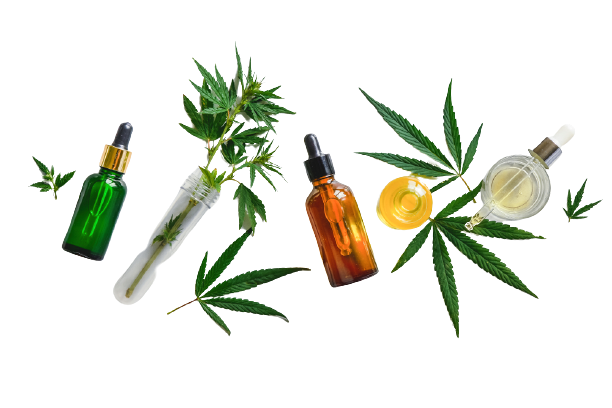
A) Mood Disorders In Animals
Animal studies involving models of depression have shown that daily CBD supplementation in mice had a significant reduction in depression scores when compared to placebos [3].
Another study investigated the details of how CBD exerts its antidepressant effects and found that CBD inhibited the reuptake of serotonin in mice brains [2]. This is the same mechanism that the common antidepressants — SSRIs — use to treat depression.
Animal studies have also investigated the role CBD plays in obsessive-compulsive disorder — measured through a test involving marble-burying habits in mice [10].
B) Mood Disorders In Humans
The most significant human study involving cannabis and depression investigated the use of the plant to see if it was a potential cause for depression. With over 45,000 participants, the study concluded that cannabis was not likely to cause depression [1].
Human studies have also shown that CBD supplementation reduced anxiety during simulated public speaking events (400 mg dose) [5], and exposure to fearful facial expressions (600 mg dose) [7, 8]. It was also shown to improve mood in patients suffering from generalized anxiety disorder [9].
Guide to Using CBD for Anxiety & Depression
Using CBD for supporting our mood and stress levels is fairly straightforward. As long as we’re getting the right dose (more on how to do this later), and stay away from low-quality or contaminated CBD products — were likely going to experience at least some improvement on our stress levels and mood.
However, if you follow this simple 4 step process, you can truly dial in your CBD supplementation to get as much benefit as possible out of your CBD.
Step #1: Choose The Best CBD Products for Anxiety
The CBD market is brand new and still lacks a lot of the regulation needed to keep bad products out of the marketplace. This makes it easy for companies to sell really poor-quality CBD oils at a high markup — making a quick buck in the meantime. By the time regulation works its way in, these companies will simply step out of the market and count their cash.
Reading reviews on your products is a good way to get unbiased information and opinions on the products by people who know exactly what to look for and how to assess it.
Factors to Consider When Buying CBD:
- Third-party test results
- Product potencies
- Additional information about the company
- Quality of the hemp being used
- Customer service responsiveness and knowledge
- Additional ingredients list
Check Out The Best CBD:THC Ratio for Anxiety.
Step #2: Determine the CBD Oil Dosage for Stress, Anxiety, & Depression
Dosing CBD oil isn’t an exact science. Everybody responds differently to CBD products, so the dose is different for everyone.
In general, the dose of CBD for managing stress is around 10 – 50 mg per dose. Some people take one dose per day, others two or three.
The easiest way to find the dose of CBD for your body is to use our CBD oil dosage calculator below. Everybody is different, so start with the lowest dose and increase once you know how your body reacts.
In general, the doses of CBD for stress, anxiety, and depression are in the following ranges:
- Mild Stress — Mild dosage
- Severe Stress — Moderate dosage
- Mild Anxiety — Moderate dosage
- Severe Anxiety — Heavy dosage
- Depression — Heavy dosage
If you experience any side-effects, it means you’ve taken a dose that’s too high for your body. Reduce the dose the next time to the last dose that didn’t produce side effects — this is your maximum dose.
CBD Dosage Calculator
These doses are in mg of CBD. You may take anywhere from 1 dose of CBD, to 3 doses in a day depending on your symptoms and how long the effects of the CBD last for you. Most people report about 8 hours of effects.
Step #3: Monitor Any Changes
It’s a good idea whenever taking any medication or supplement for stress and mood levels. Keeping track of your dosing, and any changes— both good and bad — are extremely helpful for dialing you’re supplementing in, and tracking the effectiveness (or lack thereof).
Mood and stress are very broad — it can be hard to tell if there’s any improvement or not on a day to day basis. For this reason, we recommend you quantify your feelings on a regular basis so that you or your doctor can look back on your progress after a few weeks, and months.
To do this, simply keep some notes in a journal, or on your computer. Set a timer on your phone to go off at a specific time once per week to remind you to fill out these notes.
You can write down some simple questions of your own to answer, use our sample at the bottom of the section, or find an official version to use online.
These questions should only take 1–5 minutes to complete depending on which one you use.
Some Sample Questions to Ask to Monitor Your Progress with CBD
- Rate your stress on a scale of 1 to 10
- Rate your mood on a scale of 1 to 10
- Rate the average quality of your sleep on a scale of 1 to 10
- Describe your mood today in a sentence
- How many times have you exercised this week?
- What was your daily dose of CBD?
- What other supplements did you take this week?
Note: 1 is the lowest on this rating, and 10 is the highest. A 1 stress rating would be you at your most relaxed and calm, while a 10 would mean you feel like you’re running away from a lion.
You can use modifications of this list as daily, weekly, or monthly questions.
CBD can take a few weeks for some people to begin experiencing its benefits, so remember to be patient, and keep monitoring how you feel.
Wait until you’ve been using CBD oil on a daily basis for a few weeks to really know how it works for you (or not).
Step #4: Combine Other Supplements Alongside Your CBD Oil
All herbal medicine is better when used in combination with other herbs — especially if the herbs used are synergistic with each other. This means that the effects of the herbs compound off each other to produce stronger results in combination than either of them on their own.
When it comes to combining CBD oils or other products with synergistic herbs and supplements, there are a few that you should at least be aware of:
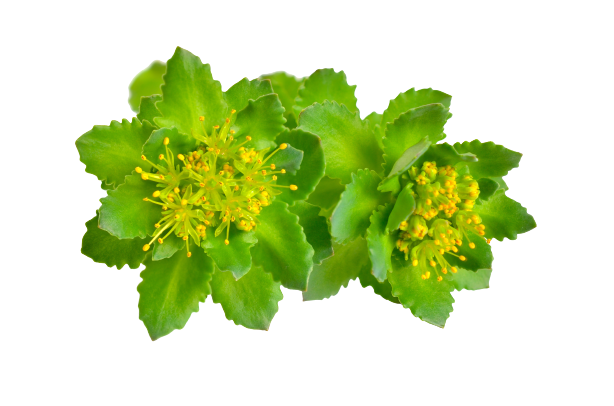
1. Rhodiola
Rhodiola (Rhodiola rosea) is a small succulent found growing at high altitudes around the world. These plants live in some of the most remote corners of the world, thriving in environments where most other organisms would quickly perish.
This herb was made famous for its use in secret Soviet research programs in the 1950s and 60s. Soldiers were given rhodiola to enhance their ability to adapt and survive in harsh environments. Sometime in the mid-60s one of the lead researchers escaped Russia to the United States where he shared a lot of the findings.
Since this time Rhodiola has become one of the most important adaptogenic supplements on earth — buffering the brain’s receptiveness to cortisol to give us a better ability to resist and manage stressors in our environment.
Rhodiola is mildly stimulating and is best for people experiencing stress from athletic exertion, long workdays, or depression involving fatigue.
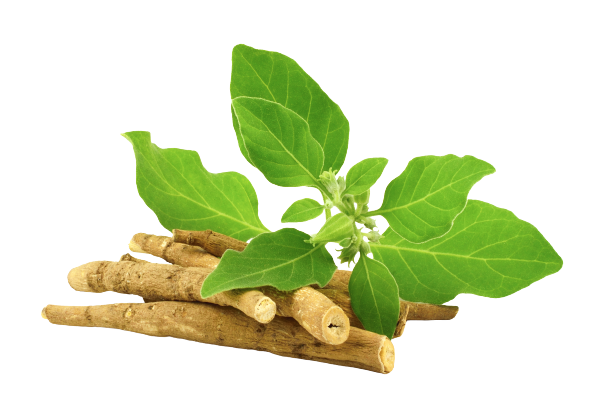
2. Ashwagandha
Ashwagandha (Withania somnifera) is another adaptogenic herb with a long history of medical use. This particular herb works more specifically on the adrenal glands where cortisol is produced. It supports the adrenal function — helping prevent burnout from excessive cortisol and catecholamine production and lowering our perceived stress level.
Ashwagandha is considered more relaxing and is better for people experiencing stress along with anxiety or insomnia.
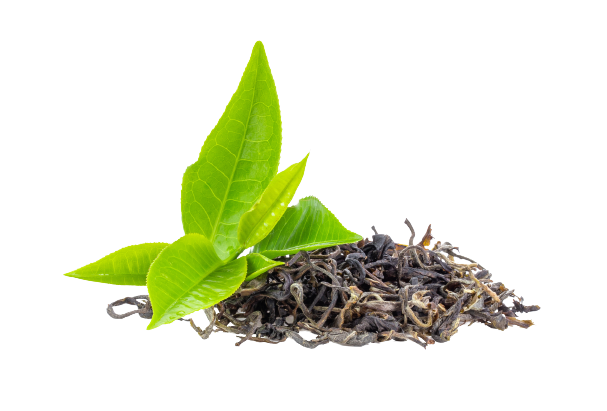
3. L-Theanine
L-theanine is an extract from the tea plant (Camellia sinensis). It’s structurally similar to glutamate — the primary stimulatory neurotransmitter in the brain.
By mimicking glutamate, L-theanine is able to bind to the glutamate receptors and block real glutamate from attaching itself and activating the neuron. The end result is a potent relaxing effect on the mind, without making us feel sluggish, or tired.
L-theanine is popular for alleviating the stress associated with long work or school sessions and can even be used to support memory and concentration. It’s also one of the best supplements to take alongside CBD oil for anxiety-related conditions.
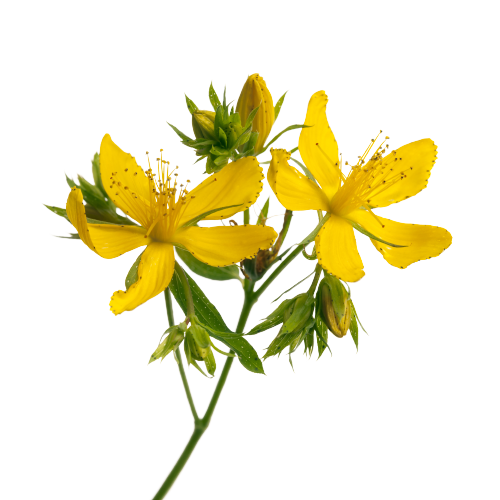
4. St. John’s Wort
St. John’s Wort (Hypericum perforatum) is arguably the best antidepressant herbal medicine on earth. It works through the same mechanism as conventional pharmaceutical antidepressants like SSRIs, only without producing the same level of side-effects.
This herb should be used cautiously and never combined with pharmaceutical antidepressants. The effects are so similar it can cause too strong of an effect — which can be dangerous.
Only use St. John’s wort with mild depressive symptoms, or under the supervision of a trained medical professional.
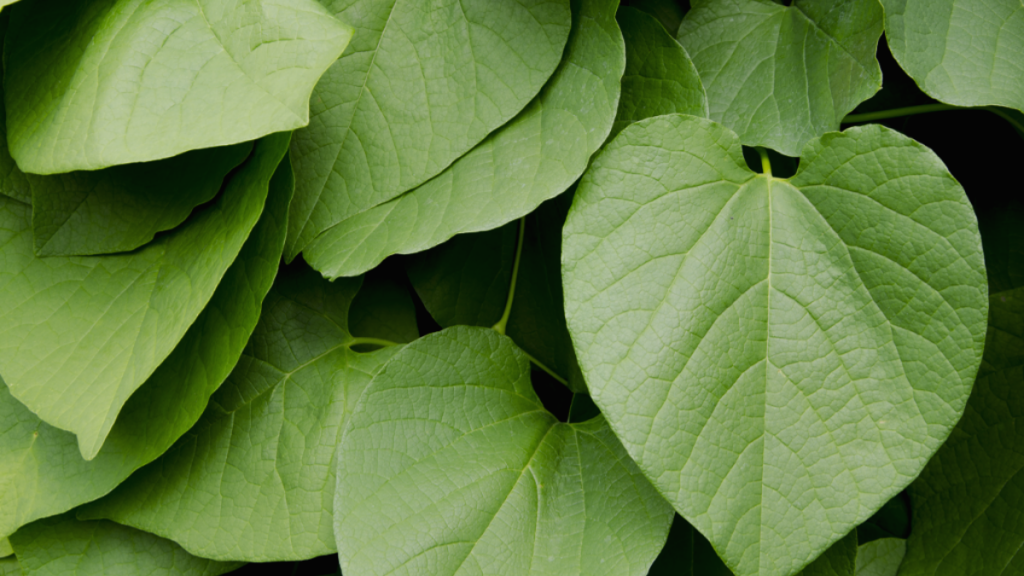
5. Kava
Kava (Piper methysticum) is a tropical plant species native to the scattered islands of the South Pacific ocean.
This herb has been used for thousands of years for its ability to induce a state of relaxation. In high doses kava has a euphoric effect. People living on islands where kava is grown use the herb as an alternative for alcohol.
In the Western world, kava is used to relieve anxiety, promote sleep, and alleviate chronic stress. Some people use the herb for its euphoric effects to alleviate symptoms of depression.
You can order this herb in its raw powder form to make into a strong tea — but I recommend ordering some capsules or a tincture instead. Kava combines very well with CBD for a synergistic benefit on stress and anxiety.
Red Flags to Watch Out For With CBD Oils
1. The Potency is Too Low
We recommend opting for the higher potency options because it’s easier to dilute a high-potency oil than it is to take large doses of a low-potency oil.
2. Contamination: Heavy Metals, Pesticides, & More
This is common, and can actually cause chemical stress to the body rather than alleviate it.
3. CBD Isolates Lack the Support of the Entourage Effect
The compounds in hemp work together to produce stronger effects. This is a concept called the entourage effect. CBD isolates tend to be less effective than full spectrum extracts.
4. Some Products Lack Supportive Ingredients
CBD works best with other beneficial extracts. Things like melatonin, L-theanine, or other herbal extracts go a long way in making the oil more effective for stress and mood support.
Summing It Up: Can CBD Help With Mood & Anxiety Disorders?
CBD has a lot of benefits — but few are as well studied as its impact on mood and anxiety levels.
Studies have shown CBD products can help regulate serotonin and dopamine, increase GABA activity in the brain, promote a more sound sleep at night, regulate the fight or flight response, and fight inflammation in the brain.
All of these changes have a positive impact on anxiety levels.
If you plan on using CBD products to help manage your anxiety, it’s important you find a reputable brand that can verify its claims through independent lab testing. It also helps to look for products that contain a full-spectrum hemp extract and a relatively high potency of CBD (at least 500 mg per ounce).
For even better results, look for CBD products that combine other anti-anxiety ingredients such as kava, L-theanine, or hops.
In Review: Best CBD For Anxiety, Stress & Mood
| Number | Product | Total CBD | Potency | Cost per mg CBD | Link |
|---|---|---|---|---|---|
|
1 |

Royal CBD Oil |
250 – 1000 mg |
8.3 – 33.3 mg/mL |
$0.15 – $0.26 |
|
|
2 |

Kiara Naturals CBG + CBD Oil |
1500 mg |
150 mg/mL |
$0.09 |
|
|
3 |

Kat’s Naturals Relax THC-Free Sublingual CBD Oil |
50 mg – 300 mg |
10 mg/mL |
$0.20 – $0.36 |
|
|
4 |

Phoria CBD Tincture with DHA Oil + CBD Oil Nano Tincture |
300 – 5000 mg |
10 – 83.3 mg/mL |
$0.02 – $0.10 |
|
|
5 |

Joy Organics Full-Spectrum Tinctures |
450–2250 mg |
15–75 mg/mL |
$0.06–$0.10 |
|
|
6 |

Nordic Oil Full-Spectrum CBD Oil (Europe) |
500 – 2000 mg |
50 – 200 mg/mL |
€0.06 – €0.08 |
|
|
7 |

The Brother’s Apothecary Mental Clarity Capsules |
168 – 672 mg |
8 mg per Capsule |
$0.07–$0.09 |
References Cited in This Article
- Manrique-Garcia, E., Zammit, S., Dalman, C., Hemmingsson, T., & Allebeck, P. (2012). Cannabis use and depression: a longitudinal study of a national cohort of Swedish conscripts. BMC Psychiatry, 12(1), 112.
- Banerjee, S. P., Snyder, S. H., & Mechoulam, R. A. P. H. A. E. L. (1975). Cannabinoids: influence on neurotransmitter uptake in rat brain synaptosomes. Journal of Pharmacology and Experimental Therapeutics, 194(1), 74-81.
- Réus, G. Z., Stringari, R. B., Ribeiro, K. F., Luft, T., Abelaira, H. M., Fries, G. R., … & Crippa, J. A. (2011). Administration of cannabidiol and imipramine induces antidepressant-like effects in the forced swimming test and increases brain-derived neurotrophic factor levels in the rat amygdala. Acta neuropsychiatrica, 23(5), 241-248.
- Campos, A. C., Moreira, F. A., Gomes, F. V., Del Bel, E. A., & Guimaraes, F. S. (2012). Multiple mechanisms involved in the large-spectrum therapeutic potential of cannabidiol in psychiatric disorders. Philosophical Transactions of the Royal Society B: Biological Sciences, 367(1607), 3364-3378.
- Zuardi, A. W., Cosme, R. A., Graeff, F. G., & Guimarães, F. S. (1993). Effects of ipsapirone and cannabidiol on human experimental anxiety. Journal of psychopharmacology, 7(1), 82-88.
- de Souza Crippa, J. A., Zuardi, A. W., Garrido, G. E., Wichert-Ana, L., Guarnieri, R., Ferrari, L., … & McGuire, P. K. (2004). Effects of cannabidiol (CBD) on regional cerebral blood flow. Neuropsychopharmacology, 29(2), 417.
- Hsiao, Y. T., Yi, P. L., Li, C. L., & Chang, F. C. (2012). Effect of cannabidiol on sleep disruption induced by the repeated combination tests consisting of open field and elevated plus-maze in rats. Neuropharmacology, 62(1), 373-384.
- Fusar-Poli, P., Allen, P., Bhattacharyya, S., Crippa, J. A., Mechelli, A., Borgwardt, S., … & Zuardi, A. W. (2010). Modulation of effective connectivity during emotional processing by Δ9-tetrahydrocannabinol and cannabidiol. International journal of neuropsychopharmacology, 13(4), 421-432.
- Crippa, J. A. S., Derenusson, G. N., Ferrari, T. B., Wichert-Ana, L., Duran, F. L., Martin-Santos, R., … & Filho, A. S. (2011). Neural basis of anxiolytic effects of cannabidiol (CBD) in generalized social anxiety disorder: a preliminary report. Journal of Psychopharmacology, 25(1), 121-130.
- Casarotto, P. C., Gomes, F. V., Resstel, L. B., & Guimarães, F. S. (2010). Cannabidiol inhibitory effect on marble-burying behaviour: involvement of CB1 receptors. Behavioural pharmacology, 21(4), 353-358.
- Esposito, G., De Filippis, D., Maiuri, M. C., De Stefano, D., Carnuccio, R., & Iuvone, T. (2006). Cannabidiol inhibits inducible nitric oxide synthase protein expression and nitric oxide production in β-amyloid stimulated PC12 neurons through p38 MAP kinase and NF-κB involvement. Neuroscience letters, 399(1-2), 91-95.
- Esposito, G., Scuderi, C., Valenza, M., Togna, G. I., Latina, V., De Filippis, D., … & Steardo, L. (2011). Cannabidiol reduces Aβ-induced neuroinflammation and promotes hippocampal neurogenesis through PPARγ involvement. PloS one, 6(12), e28668.
- Ludányi, A., Erőss, L., Czirják, S., Vajda, J., Halász, P., Watanabe, M., … & Katona, I. (2008). Downregulation of the CB1 cannabinoid receptor and related molecular elements of the endocannabinoid system in epileptic human hippocampus. Journal of Neuroscience, 28(12), 2976-2990.
- Samuels, B. A., & Hen, R. (2011). Neurogenesis and affective disorders. European Journal of Neuroscience, 33(6), 1152-1159.
- Hill, M. N., & Gorzalka, B. B. (2009). The endocannabinoid system and the treatment of mood and anxiety disorders. CNS & Neurological Disorders-Drug Targets (Formerly Current Drug Targets-CNS & Neurological Disorders), 8(6), 451-458., 8(6), 451-458.
- Huestis, M. A., Gorelick, D. A., Heishman, S. J., Preston, K. L., Nelson, R. A., Moolchan, E. T., & Frank, R. A. (2001). Blockade of effects of smoked marijuana by the CB1-selective cannabinoid receptor antagonist SR141716. Archives of general psychiatry, 58(4), 322-328.
- Wise, R. A., & Bozarth, M. A. (1985). Brain mechanisms of drug reward and euphoria. Psychiatric medicine, 3(4), 445-460.
- Cheer, J. F., Wassum, K. M., Sombers, L. A., Heien, M. L., Ariansen, J. L., Aragona, B. J., … & Wightman, R. M. (2007). Phasic dopamine release evoked by abused substances requires cannabinoid receptor activation. Journal of Neuroscience, 27(4), 791-795.
- Cippitelli, A., Bilbao, A., Hansson, A. C., Del Arco, I., Sommer, W., Heilig, M., … & De Fonseca, F. R. (2005). Cannabinoid CB1 receptor antagonism reduces conditioned reinstatement of ethanol‐seeking behavior in rats. European Journal of Neuroscience, 21(8), 2243-2251.
- Cohen, C., Perrault, G., Griebel, G., & Soubrié, P. (2005). Nicotine-associated cues maintain nicotine-seeking behavior in rats several weeks after nicotine withdrawal: reversal by the cannabinoid (CB 1) receptor antagonist, rimonabant (SR141716). Neuropsychopharmacology, 30(1), 145.
- Hill, M. N., Miller, G. E., Ho, W. S. V., Gorzalka, B. B., & Hillard, C. J. (2008). Serum endocannabinoid content is altered in females with depressive disorders: a preliminary report. Pharmacopsychiatry, 41
- Parolaro, D., Realini, N., Vigano, D., Guidali, C., & Rubino, T. (2010). The endocannabinoid system and psychiatric disorders. Experimental neurology, 224(1), 3-14.
- Viveros, M. P., Marco, E. M., & File, S. E. (2005). Endocannabinoid system and stress and anxiety responses. Pharmacology Biochemistry and Behavior, 81(2), 331-342.
- Hurley, L. L., & Tizabi, Y. (2013). Neuroinflammation, neurodegeneration, and depression. Neurotoxicity research, 23(2), 131-144.
- Zuardi, A. W., Shirakawa, I., Finkelfarb, E., & Karniol, I. G. (1982). Action of cannabidiol on the anxiety and other effects produced by Δ 9-THC in normal subjects. Psychopharmacology, 76(3), 245-250.
- Zuardi, A. W., Cosme, R. A., Graeff, F. G., & Guimarães, F. S. (1993). Effects of ipsapirone and cannabidiol on human experimental anxiety. Journal of psychopharmacology, 7(1_suppl), 82-88.
- Banerjee, S. P., Snyder, S. H., & Mechoulam, R. A. P. H. A. E. L. (1975). Cannabinoids: influence on neurotransmitter uptake in rat brain synaptosomes. Journal of Pharmacology and Experimental Therapeutics, 194(1), 74-81.
- Crippa, J. A. S., Derenusson, G. N., Ferrari, T. B., Wichert-Ana, L., Duran, F. L., Martin-Santos, R., … & Filho, A. S. (2011). Neural basis of anxiolytic effects of cannabidiol (CBD) in generalized social anxiety disorder: a preliminary report. Journal of Psychopharmacology, 25(1), 121-130.
- Bakas, T., Van Nieuwenhuijzen, P. S., Devenish, S. O., McGregor, I. S., Arnold, J. C., & Chebib, M. (2017). The direct actions of cannabidiol and 2-arachidonoyl glycerol at GABAA receptors. Pharmacological research, 119, 358-370.
- Sales, A. J., Crestani, C. C., Guimarães, F. S., & Joca, S. R. (2018). Antidepressant-like effect induced by Cannabidiol is dependent on brain serotonin levels. Progress in Neuro-Psychopharmacology and Biological Psychiatry, 86, 255-261.
- Charney, D. S., Woods, S. W., Goodman, W. K., & Heninger, G. R. (1987). Serotonin function in anxiety. Psychopharmacology, 92(1), 14-24.
- Zweifel, L. S., Fadok, J. P., Argilli, E., Garelick, M. G., Jones, G. L., Dickerson, T. M., … & Palmiter, R. D. (2011). Activation of dopamine neurons is critical for aversive conditioning and prevention of generalized anxiety. Nature neuroscience, 14(5), 620-626.
- Seeman, P. (2016). Cannabidiol is a partial agonist at dopamine D2High receptors, predicting its antipsychotic clinical dose. Translational psychiatry, 6(10), e920-e920.
- Bakas, T., Van Nieuwenhuijzen, P. S., Devenish, S. O., McGregor, I. S., Arnold, J. C., & Chebib, M. (2017). The direct actions of cannabidiol and 2-arachidonoyl glycerol at GABAA receptors. Pharmacological research, 119, 358-370.
- Rossi, S., Studer, V., Motta, C., Polidoro, S., Perugini, J., Macchiarulo, G., … & Furlan, R. (2017). Neuroinflammation drives anxiety and depression in relapsing-remitting multiple sclerosis. Neurology, 89(13), 1338-1347.
- Mori, M. A., Meyer, E., Soares, L. M., Milani, H., Guimarães, F. S., & de Oliveira, R. M. W. (2017). Cannabidiol reduces neuroinflammation and promotes neuroplasticity and functional recovery after brain ischemia. Progress in Neuro-Psychopharmacology and Biological Psychiatry, 75, 94-105.
- Sagaspe, P., Sanchez-Ortuno, M., Charles, A., Taillard, J., Valtat, C., Bioulac, B., & Philip, P. (2006). Effects of sleep deprivation on Color-Word, Emotional, and Specific Stroop interference and on self-reported anxiety. Brain and cognition, 60(1), 76-87.
- Russo, E. B., Guy, G. W., & Robson, P. J. (2007). Cannabis, pain, and sleep: lessons from therapeutic clinical trials of Sativex®, a cannabis‐based medicine. Chemistry & biodiversity, 4(8), 1729-1743.
- Cota, D. (2008). The role of the endocannabinoid system in the regulation of hypothalamic‐pituitary‐adrenal axis activity. Journal of neuroendocrinology, 20, 35-38.
- Banerjee, S. P., Snyder, S. H., & Mechoulam, R. A. P. H. A. E. L. (1975). Cannabinoids: influence on neurotransmitter uptake in rat brain synaptosomes. Journal of Pharmacology and Experimental Therapeutics, 194(1), 74-81.
- Réus, G. Z., Stringari, R. B., Ribeiro, K. F., Luft, T., Abelaira, H. M., Fries, G. R., … & Crippa, J. A. (2011). Administration of cannabidiol and imipramine induces antidepressant-like effects in the forced swimming test and increases brain-derived neurotrophic factor levels in the rat amygdala. Acta neuropsychiatrica, 23(5), 241-248.
- R de Mello Schier, A., P de Oliveira Ribeiro, N., S Coutinho, D., Machado, S., Arias-Carrión, O., A Crippa, J., … & C Silva, A. (2014). Antidepressant-like and anxiolytic-like effects of cannabidiol: a chemical compound of Cannabis sativa. CNS & Neurological Disorders-Drug Targets (Formerly Current Drug Targets-CNS & Neurological Disorders), 13(6), 953-960.
- Cowen, P. J., & Browning, M. (2015). What has serotonin to do with depression?. World Psychiatry, 14(2), 158-160.
- Smith, K. A., Fairburn, C. G., & Cowen, P. J. (1997). Relapse of depression after rapid depletion of tryptophan. The Lancet, 349(9056), 915-919.
- Wichers, M. C., Koek, G. H., Robaeys, G., Verkerk, R., Scharpe, S., & Maes, M. (2005). IDO and interferon-α-induced depressive symptoms: a shift in hypothesis from tryptophan depletion to neurotoxicity. Molecular psychiatry, 10(6), 538.
- Pellati, F., Borgonetti, V., Brighenti, V., Biagi, M., Benvenuti, S., & Corsi, L. (2018). Cannabis sativa L. and nonpsychoactive cannabinoids: their chemistry and role against oxidative stress, inflammation, and cancer. BioMed research international, 2018.
- Manrique-Garcia, E., Zammit, S., Dalman, C., Hemmingsson, T., & Allebeck, P. (2012). Cannabis use and depression: a longitudinal study of a national cohort of Swedish conscripts. BMC psychiatry, 12(1), 112.
- Hampson, A. J., Grimaldi, M., Axelrod, J., & Wink, D. (1998). Cannabidiol and (−) Δ9-tetrahydrocannabinol are neuroprotective antioxidants. Proceedings of the National Academy of Sciences, 95(14), 8268-8273.
Conditions that May Respond to Cannabidiol
-
Conditions Related to Health Benefits
- CBD For Allergies: Can This Cannabinoid Ease Symptoms?
- Top 10 CBD Oils For Back Pain
- Can CBD Help With Menstrual Cramps?
- CBD for Sciatica: How It Works, Safety, Drug Interactions, & Best Products
- Is CBD a Viable Treatment for Cerebral Palsy?
- CBD Oil For Sleep
- CBD For Psoriasis: Can CBD Help to Alleviate Symptoms?
- Traumatic Brain Injury (TBI)
- Arthritis
- Anxiety & Depression
- Weight Loss
- ADD & ADHD
- Anorexia
- Alzheimer’s Disease & Dementia
- Addiction
- ALS (Amyotrophic Lateral Sclerosis)
- Antibiotic Resistance
- Asthma
- Atherosclerosis
- Autism
- Acne
- Bipolar Disorder
- Pain
- Crohn's Disease & Ulcerative Colitis
- Diabetes
- Epilepsy
- Endocrine Disorders
- Fibromyalgia
- Fatty Liver Disease
- Glaucoma
- Hypertension
- Heart Disease
- Huntington's Disease
- Inflammation
- Irritable Bowel Syndrome (IBS)
- Kidney Disease
- Migraine Headaches
- Muscle Recovery
- Multiple Sclerosis
- Motion Sickness
- Metabolic Syndrome
- Neurodegeneration
- Cancer
- Nausea
- Neuropathic (Nerve) Pain
- Osteoporosis/Bone Health
- Obsessive-Compulsive Disorder (OCD)
- Polycystic Ovarian Syndrome (PCOS)
- PTSD
- Prion/Mad Cow Disease
- Premenstrual Syndrome (PMS)
- Parkinson’s Disease
- Schizophrenia
- Sickle Cell Anemia
- Stroke
-
Conditions Related to Products
- Ranking The Top 13 THC Gummies By Category (Δ8, Δ9, Δ10, HHC, & More)
- Top 10 CBD Oils For Back Pain
- Everything You Need to Know About CBD Sunscreen
- Top 7 CBD Gummies For Sleep & Insomnia
- Top 7 CBD Gummies To Help With Anxiety (2022)
- Best CBD Gummies For Pain (Top-Rated Pain Gummies For 2022)
- Best Hemp Cigarettes (Top 5 Nicotine-Free Smokes)
- Top 5 CBD Lip Balms For 2022
- The Top 7 CBD Face Masks for 2022
- The Best CBD Inhalers For 2022 (& How to Use Them)
- Best Full-Spectrum CBD Vape Juice: What to Look For & How to Use It
- CBD Eye Drops: New Option For Glaucoma?
- CBD Oil For Dogs With Arthritis
- Best CBD Massage Oils In 2022
- Buyer's Guide To The Best CBD Vape Kits In 2022
- CBD Chocolate: Yes, It Exists & It's Just as Divine as it Sounds
- CBD Pre-Rolls & Cigarettes
- Terpene Concentrates
- Best CBD Soaps
- Best CBD Shampoo & Conditioner
- Best CBD Juul Pods
- CBD Isolate Oils
- Full-Spectrum CBD Oils
- Best CBD Lube
- CBD Honey
- CBD Transdermal Patches
- Best Dry Herb Vaporizers
- CBD Oil For Dogs With Epilepsy
- CBD Oil For Dogs With Anxiety
- CBD Oil For Dogs With Cancer
- CBD For Horses
- CBD Chewing Gum
- CBD Pain Cream
- CBD Oil For Cats
- CBD Oil For Dogs
- CBD Hemp Flower
- CBD Suppositories
- Best CBD Gummies for Pain, Sleep & Anxiety Reviewed (2022)
- CBD Teas
- CBD Vape Pens
- CBD Vape Oils
- CBD Coffee
- CBD Drinks & Shots
- CBD Crystals
- CBD Skincare
- Best CBD Oil & Gummies For Kids: Is CBD Safe for Children with Anxiety & ADHD?
- CBD Concentrates
- CBD Bath Bombs
- CBD Capsules
- CBD Sprays
- CBD Dog Treats
-
Conditions Related to Topicals
-
Conditions Related to Oils & Tinctures
-
Conditions Related to Edibles
- Top 7 CBD Gummies To Help With Anxiety (2022)
- Best CBD Gummies For Pain (Top-Rated Pain Gummies For 2022)
- CBD Chocolate: Yes, It Exists & It's Just as Divine as it Sounds
- CBD Honey
- CBD Chewing Gum
- Best CBD Gummies for Pain, Sleep & Anxiety Reviewed (2022)
- CBD Teas
- CBD Coffee
- CBD Drinks & Shots
- CBD Capsules
-
Conditions Related to Gummies
- Ranking The Top 13 THC Gummies By Category (Δ8, Δ9, Δ10, HHC, & More)
- Top 7 CBD Gummies For Sleep & Insomnia
- Top 7 CBD Gummies To Help With Anxiety (2022)
- Best CBD Gummies For Pain (Top-Rated Pain Gummies For 2022)
- Best CBD Gummies for Pain, Sleep & Anxiety Reviewed (2022)
- Best CBD Oil & Gummies For Kids: Is CBD Safe for Children with Anxiety & ADHD?
-
Conditions Related to Hemp Flower
-
-
Conditions Related to Terpenes
-
-
Conditions Related to Cultivation
-
Conditions Related to Concentrates
-
Conditions Related to Delta 8 THC
-
Conditions Related to Delta 9 THC
-
-
-
-
Conditions Related to CBD
- Everything You Need to Know About CBD Sunscreen
- Top 7 CBD Gummies For Sleep & Insomnia
- Top 7 CBD Gummies To Help With Anxiety (2022)
- Best CBD Gummies For Pain (Top-Rated Pain Gummies For 2022)
- Best Hemp Cigarettes (Top 5 Nicotine-Free Smokes)
- Top 5 CBD Lip Balms For 2022
- The Top 7 CBD Face Masks for 2022
- The Best CBD Inhalers For 2022 (& How to Use Them)
- Best Full-Spectrum CBD Vape Juice: What to Look For & How to Use It
- CBD Eye Drops: New Option For Glaucoma?
- CBD Oil For Dogs With Arthritis
- Best CBD Massage Oils In 2022
- Buyer's Guide To The Best CBD Vape Kits In 2022
- CBD Chocolate: Yes, It Exists & It's Just as Divine as it Sounds
- CBD Pre-Rolls & Cigarettes
- Best CBD Soaps
- Best CBD Shampoo & Conditioner
- Best CBD Juul Pods
- CBD Isolate Oils
- Full-Spectrum CBD Oils
- Best CBD Lube
- CBD Honey
- CBD Transdermal Patches
- CBD Oil For Dogs With Epilepsy
- CBD Oil For Dogs With Anxiety
- CBD Oil For Dogs With Cancer
- CBD For Horses
- CBD Chewing Gum
- CBD Pain Cream
- CBD Oil For Cats
- CBD Oil For Dogs
- CBD Hemp Flower
- CBD Suppositories
- Best CBD Gummies for Pain, Sleep & Anxiety Reviewed (2022)
- CBD Teas
- CBD Vape Pens
- CBD Vape Oils
- CBD Coffee
- CBD Drinks & Shots
- CBD Crystals
- CBD Skincare
- Best CBD Oil & Gummies For Kids: Is CBD Safe for Children with Anxiety & ADHD?
- CBD Concentrates
- CBD Bath Bombs
- CBD Capsules
- CBD Sprays
- CBD Dog Treats
-
-
Conditions Related to THC-O
-
-
Conditions Related to Joint Health
-
Conditions Related to Pain Disorders
- Top 10 CBD Oils For Back Pain
- Can CBD Help With Menstrual Cramps?
- CBD for Sciatica: How It Works, Safety, Drug Interactions, & Best Products
- Traumatic Brain Injury (TBI)
- Arthritis
- Pain
- Fibromyalgia
- Glaucoma
- Inflammation
- Kidney Disease
- Migraine Headaches
- Multiple Sclerosis
- Neuropathic (Nerve) Pain
- Premenstrual Syndrome (PMS)
- Sickle Cell Anemia
-
Conditions Related to Autoimmune Disease
-
Conditions Related to Cognitive Health
-
Conditions Related to Metabolic Disorders
-
Conditions Related to Psychological Disorders
-
Conditions Related to Muscles & Bones
-
Conditions Related to Nervous System
- CBD for Sciatica: How It Works, Safety, Drug Interactions, & Best Products
- Is CBD a Viable Treatment for Cerebral Palsy?
- CBD Oil For Sleep
- Traumatic Brain Injury (TBI)
- Anxiety & Depression
- ADD & ADHD
- Anorexia
- Alzheimer’s Disease & Dementia
- Addiction
- ALS (Amyotrophic Lateral Sclerosis)
- Autism
- Bipolar Disorder
- Epilepsy
- Huntington's Disease
- Inflammation
- Migraine Headaches
- Multiple Sclerosis
- Motion Sickness
- Neurodegeneration
- Neuropathic (Nerve) Pain
- Obsessive-Compulsive Disorder (OCD)
- PTSD
- Prion/Mad Cow Disease
- Parkinson’s Disease
- Schizophrenia
-
-
Conditions Related to Reproductive Health
-
Conditions Related to Hormones & Endocrine
-
Conditions Related to Skin Health
-
Conditions Related to Cardiovascular System
-
Conditions Related to Digestive System
-
Conditions Related to Genetic Disorders
-
Conditions Related to For Children

